Blockade of Germany may refer to:
- Blockade of Germany (1914–1919) during World War I
- Blockade of Germany (1939–1945) during World War II
Blockade of Germany may refer to:
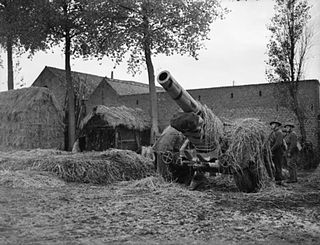
The Phoney War was an eight-month period at the start of World War II during which there was only one limited military land operation on the Western Front, when French troops invaded Germany's Saar district. Nazi Germany carried out the invasion of Poland on 1 September 1939. The Phoney period began with the declaration of war by the United Kingdom and France against Nazi Germany on 3 September 1939, after which little actual warfare occurred, and ended with the German invasion of France and the Low Countries on 10 May 1940. Although there was no large-scale military action by Britain and France, they did begin some economic warfare, especially with the naval blockade and shut down German surface raiders. They created elaborate plans for numerous large-scale operations designed to cripple the German war effort. These included opening an Anglo-French front in the Balkans, invading Norway to seize control of Germany's main source of iron ore, and an embargo against the Soviet Union, which supplied Germany's main source of oil. By April 1940, the lone execution of the Norway plan was considered inadequate to stop the German offensive.
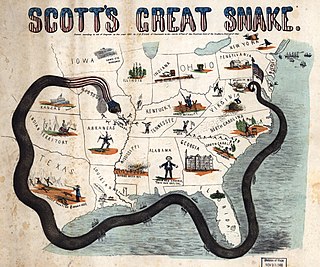
A blockade is the act of actively preventing a country or region from receiving or sending out food, supplies, weapons, or communications, and sometimes people, by military force. A blockade differs from an embargo or sanction, which are legal barriers to trade rather than physical barriers. It is also distinct from a siege in that a blockade is usually directed at an entire country or region, rather than a fortress or city and the objective may not always be to conquer the area.

The siege of Leningrad was a prolonged military blockade undertaken by the Axis powers against the Soviet city of Leningrad on the Eastern Front of World War II. Germany's Army Group North advanced from the south, while the German-allied Finnish army invaded from the north and completed the ring around the city.
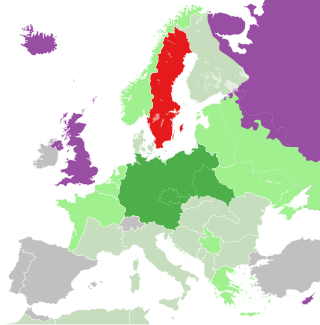
Sweden maintained its policy of neutrality during World War II. When the war began on 1 September 1939, the fate of Sweden was unclear. But by a combination of its geopolitical location in the Scandinavian Peninsula, realpolitik maneuvering during an unpredictable course of events, and a dedicated military build-up after 1942, Sweden kept its official neutrality status throughout the war. At the outbreak of hostilities, Sweden had held a neutral stance in international relations for more than a century, since the end of the Napoleonic Wars in 1814 and the invasion of Norway.

A blockade runner is a merchant vessel used for evading a naval blockade of a port or strait. It is usually light and fast, using stealth and speed rather than confronting the blockaders in order to break the blockade. Blockade runners usually transport cargo, for example bringing food or arms to a blockaded city. They have also carried mail in an attempt to communicate with the outside world.
Kate name may refer to:
Swedish iron ore was an important economic and military factor in the European theatre of World War II, as Sweden was the main contributor of iron ore to Nazi Germany. The average percentages by source of Nazi Germany’s iron ore procurement through 1933–43 by source where: Sweden: 43.0 Domestic production(Germany): 28.2 France: 12.9. Within the German military the Navy was most dependent on Swedish steel as an absolute necessity to the German war effort, according to their grand admiral. It has also been argued that the Swedish export helped prolong the war.

The Union blockade in the American Civil War was a naval strategy by the United States to prevent the Confederacy from trading.

The Siege of Tsingtao was the attack on the German port of Tsingtao during World War I by Japan and the United Kingdom. The siege was waged against Imperial Germany between 27 August and 7 November 1914. The siege was the first encounter between Japanese and German forces, the first Anglo-Japanese operation of the war, and the only major land battle in the Asian and Pacific theatre during World War I.

During World War I, the German Empire was one of the Central Powers. It began participation in the conflict after the declaration of war against Serbia by its ally, Austria-Hungary. German forces fought the Allies on both the eastern and western fronts, although German territory itself remained relatively safe from widespread invasion for most of the war, except for a brief period in 1914 when East Prussia was invaded. A tight blockade imposed by the Royal Navy caused severe food shortages in the cities, especially in the winter of 1916–17, known as the Turnip Winter. At the end of the war, Germany's defeat and widespread popular discontent triggered the German Revolution of 1918–1919 which overthrew the monarchy and established the Weimar Republic.
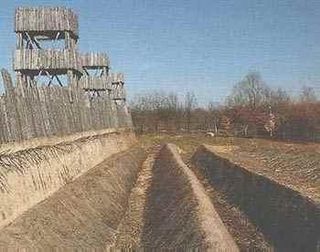
Investment is the military process of surrounding an enemy fort with armed forces to prevent entry or escape. It serves both to cut communications with the outside world and to prevent supplies and reinforcements from being introduced.
An airbridge is the route and means of delivering material from one place to another by an airlift.
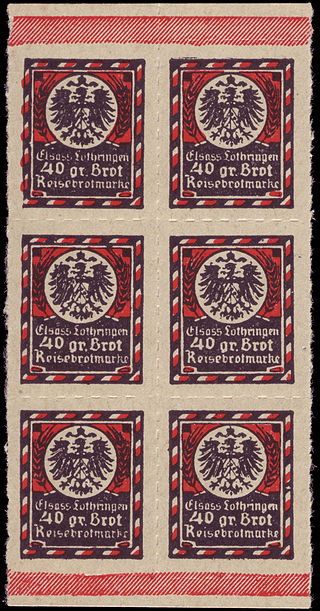
The Blockade of Germany, or the Blockade of Europe, occurred from 1914 to 1919. The prolonged naval blockade was conducted by the Allies during and after World War I in an effort to restrict the maritime supply of goods to the Central Powers, which included Germany, Austria-Hungary, and the Ottoman Empire. The blockade is considered one of the key elements in the eventual Allied victory in the war. The German Board of Public Health in December 1918 claimed that 763,000 German civilians had already died from starvation and disease, caused by the blockade. An academic study done in 1928 put the death toll at 424,000. An additional 100,000 people may have died during the post-armistice continuation of the blockade in 1919.

The Berlin Blockade was one of the first major international crises of the Cold War. During the multinational occupation of post–World War II Germany, the Soviet Union blocked the Western Allies' railway, road, and canal access to the sectors of Berlin under Western control. The Soviets offered to drop the blockade if the Western Allies withdrew the newly introduced Deutsche Mark from West Berlin.
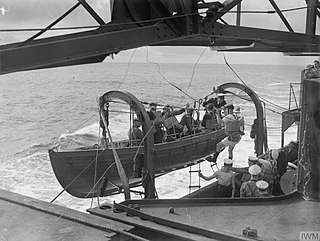
The Blockade of Germany (1939–1945), also known as the Economic War, involved operations carried out during World War II by the British Empire and by France in order to restrict the supplies of minerals, fuel, metals, food and textiles needed by Nazi Germany – and later by Fascist Italy – in order to sustain their war efforts. The economic war consisted mainly of a naval blockade, which formed part of the wider Battle of the Atlantic, but also included the bombing of economically important targets and the preclusive buying of war materials from neutral countries in order to prevent their sale to the Axis powers.
Force B was a Royal Navy task force during the Second World War.

Z32 was a German Type 1936A (Mob) destroyer, which was completed in 1942 and which served with the 8th Destroyer Flotilla of the Kriegsmarine during the Second World War. She fought in the Battle of the Bay of Biscay against HMS Glasgow and HMS Enterprise, alongside the German 8th Destroyer Flotilla and the 4th Torpedo Boat Flotilla. She mainly operated from German-occupied French Atlantic ports, escorting blockade runners and U-boats, and was sunk during the Battle of Ushant on 9 June 1944.
The 288th Rifle Division was an infantry division of the Soviet Union's Red Army during World War II. Formed in the summer of 1941, the division was sent into combat on the Volkhov Front in the fall of that year. The division served in the area until early 1944 when the siege of Leningrad was ended and the 288th advanced into the Baltic states. The division spent the final months of the war blockading trapped German troops in the Courland Pocket before being disbanded in early 1946.
Battle of La Rochelle or Siege of La Rochelle may refer to:

The onset of the 20th Century saw England as the world's foremost naval and colonial power, supported by a 100,000-man firefighting army designed to fight small wars in its outlying colonies. Since the Napoleonic Wars nearly a century earlier, Britain and Europe enjoyed relative peace and tranquility. The onset of World War I caught the British Empire by surprise. As it increased the size of its army through conscription, one of its first tasks was to impose a complete naval blockade against Germany. It was not popular in the United States. However, it was very important to England.